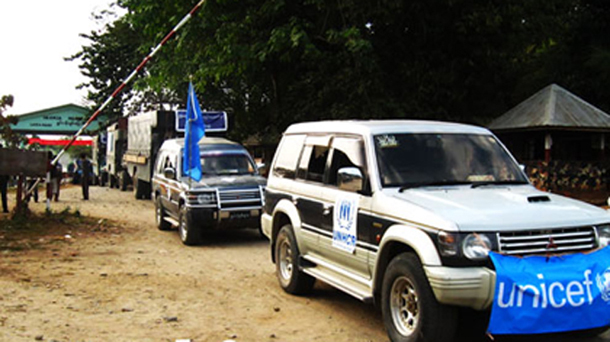Burma is vulnerable to natural disasters and humanitarian crises. The worst recent natural disaster, Cyclone Nargis, struck Burma on May 2-3, 2008. Around 140,000 people lost their lives and 2.4 million people were severely affected. On Oct. 22, 2010, in Arakan State, Cyclone Giri left 45 people dead and affected the lives of some 260,000 people.
An earthquake on March 24, 2011, in the southern part of the Shan State close to the borders between Burma, Thailand and Laos had a magnitude of 6.8 on the Richter scale. These and other disasters brought on by nature have caused untold human suffering to the Burmese people. Thousands upon thousands have had to rebuild their lives from scratch.
In addition to natural disasters, there is ongoing conflict in Kachin State and communal tensions in Arakan State which have led to displacement of a large number of people and for which an immediate humanitarian response is needed.
In all humanitarian situations, it is the local communities and state actors that have been the first to respond. Neighbors helped one another, religious groups and community leaders responded instantaneously.
These were the people, the first heroes of the situation, who have saved lives. Burma has learned from these disasters and the communities have become even more resilient. Nevertheless, communities must be strengthened and supported. The government now recognizes where its efforts could be boosted by international assistance.
It is the government which has the primary responsibility for its people. The United Nations (UN) and humanitarian community are there to work with the government and partners on the ground. This is how we work everywhere in the world, and this is how we work in Burma.
At the same time, humanitarian assistance is guided by principles which ensure that assistance is provided by identifying who is most in need, what their needs are and how best these needs can be met. This means that we deliver independently and in a neutral manner without bias towards any race, religion or conviction.
The humanitarian assistance that is delivered by the UN and its partners in the national and international non-governmental organizations (NGOs) and civil society groups, is transparent and accountable through mechanisms that are recognized by the government, donors and the recipients of assistance.
As a trusted partner, the UN has delivered both developmental and humanitarian assistance in Burma and in countries all over the world for a number of years. The activities of the UN in Burma are nationwide.
From Kachin State in the north, to Taninthayi and Mon State in the southeast; from Shan and Kayin State in the east, to Chin and Arakan State in the west; the UN delivers where it can with what it can. It works with its partners, both in government and in civil society, in particular international and national NGOs who are vital for services to reach people on the ground.
Between January and May this year alone, 545,000 people in Burma received 10,250 metric tons of food, including 8,930 metric tons or 178,000 bags of rice, countrywide.
Humanitarian partners are striving to provide assistance to all the victims of the Kachin conflict. As a contribution to this collective effort, this year alone in Kachin State UN assistance has been directly provided to as many as 40,000 internally displaced persons, including through nine UN-supported convoys that have delivered food and household items to some 15,000 persons in 13 locations in areas affected by the conflict.
The assistance given to the displaced in Kachin faces many challenges, both brought about by the conflict and also due to weather and geographical conditions and infrastructure. It is highly dependent on the dedicated efforts of the various communities and partners who are there on the ground, and are able to reach out to the displaced families in areas that the UN and its partners have been unable to reach.
Communal violence in Arakan State has resulted in the destruction of homes, loss of lives and livelihoods and much human suffering. According to the latest figures from the local authorities, over 63,000 people remain displaced across Arakan State. Many more may have also been affected and are in need of support.
Once again, it is local community structures that have initially taken care of the displaced and the distressed. Donations and offers of assistance from civil society groups and private individuals have been reported daily in the local media. Humanitarian partners strive to complement these efforts and assist all those in need.
Humanitarian workers strive to build trust in the community. When natural disasters strike, resilience increases through communal trust and warmth. Conflict and violence, however, are fueled by mistrust, thereby eroding communities.
Natural disasters last a few days at most and communities pick up their lives once again as resilience becomes stronger. Conflicts and tension can be more prolonged. Traumatized communities are weakened. Hatred and mistrust are also fueled by misinformation and rumors.
We must provide full transparency of information through every means, including the media, to avoid the consequences of misinformation to enhance trust with the victims of crises and the authorities.
Burma is playing catch-up with the rest of the world. In his speech on June 20, President Thein Sein underscored partnerships with the UN, international NGOs and civil society in his plans for the development of Burma. The UN and its partners stand ready to provide assistance to those in need in accordance with the humanitarian principles of independence, neutrality and impartiality.
While acts of god are unavoidable, humanitarian disasters brought about by man must not stand in the way of Burma’s development and progress towards democracy. The UN and its partners are here to work with the people of Burma to support what can be achieved by its people for its people.
Ashok Nigam is the United Nations Resident and Humanitarian Coordinator in Burma. His views are his own and do not necessarily reflect those of The Irrawaddy.
















